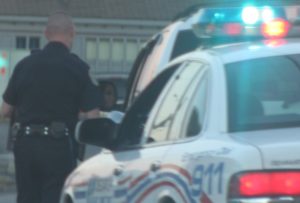Failure to Yield to Stationary Emergency Vehicle
May 14, 2017 by Jean Humbrecht
Virginia law requires drivers to move over when approaching an emergency vehicle on the side of the road if it is safe to do so. Failure to move over or use caution when approaching an emergency vehicle is a traffic infraction and a second offense is a crime. This law is found in Va. Code §46.2-921.1, Failure to Yield to Stationary Emergency Vehicle in Virginia.
Proof of Failure to Yield to Stationary Emergency Vehicle in Virginia


Failure to Yield to Stationary Emergency Vehicle in Virginia Can be a Traffic Infraction or a Crime
Va. Code §46.2-921.1 requires drivers of any motor vehicles to proceed with caution when approaching a stationary vehicle that is displaying flashing, blinking, or alternating blue, red, or amber lights. If the driver is on a highway having at least four lanes, two of which are intended for traffic proceeding as the approaching vehicle, a driver must proceed with caution and yield the right-of-way to the emergency vehicle. The driver must move into a lane that is not adjacent with the emergency vehicle if it is safe to do so or, if it is not safe to change lanes, the driver must still proceed with caution and maintain a safe speed for the highway conditions.
Failure to proceed with caution or change lanes if it is possible to do so is considered failure to yield the right-of-way to a stationary emergency vehicle and is a violation of Va. Code §46.2-921.1.
Penalty for Failure to Yield to Stationary Emergency Vehicle in Virginia
A first offense Failure to Yield to Stationary Emergency Vehicle in Virginia charge under Va. Code §46.2-921.1 is a traffic infraction. It is punished with a fine up to $250 and DMV demerit points. If the violation of this statute resulted in damage to another person’s property, the court can suspend the driver’s privilege to drive for up to one year. If someone was injured or killed as a result of a violation of Failure to Yield to Stationary Emergency Vehicle in Virginia under Va. Code §46.2-921.1, the court can also suspend his privilege to drive for up to two years.
A second offense Failure to Yield to Stationary Emergency Vehicle in Virginia charge is a CRIME. It is a Class 1 misdemeanor, punished with up to 12 months in jail, a fine up to $2500, or both.
Failure to Yield to Stationary Emergency Vehicle in Virginia: Statute
§46.2-921.1. Drivers to yield right-of-way or reduce speed when approaching stationary emergency vehicles on highways; penalties.
(i) on a highway having at least four lanes, at least two of which are intended for traffic proceeding as the approaching vehicle, proceed with caution and, if reasonable, with due regard for safety and traffic conditions, yield the right-of-way by making a lane change into a lane not adjacent to the stationary vehicle or
(ii) if changing lanes would be unreasonable or unsafe, proceed with due caution and maintain a safe speed for highway conditions.
B. A violation of any provision of this section shall be punishable as a traffic infraction, except that a second or subsequent violation of any provision of this section, when such violation involved a vehicle with flashing, blinking, or alternating blue or red lights, shall be punishable as a Class 1 misdemeanor.
C. If the violation resulted in damage to property of another person, the court may, in addition, order the suspension of the driver’s privilege to operate a motor vehicle for not more than one year. If the violation resulted in injury to another person, the court may, in addition to any other penalty imposed, order the suspension of the driver’s privilege to operate a motor vehicle for not more than two years. If the violation resulted in the death of another person, the court may, in addition to any other penalty imposed, order the suspension of the driver’s privilege to operate a motor vehicle for two years.
D. The provisions of this section shall not apply in highway work zones as defined in § 46.2-878.1.
***DISCLAIMER: THE MATERIAL AND INFORMATION CONTAINED IN THIS POST, ON ANY PAGES ON THIS WEBSITE, AND ON ANY PAGES LINKED FROM THESE PAGES, ARE FOR GENERAL INFORMATION ONLY AND NOT LEGAL ADVICE. YOU SHOULD CONSULT A LICENSED ATTORNEY IN YOUR JURISDICTION BEFORE RELYING ON ANY OF THE INFORMATION CONTAINED ON THESE PAGES. SENDING EMAIL TO OR VIEWING INFORMATION FROM THIS WEBSITE DOES NOT CREATE AN ATTORNEY-CLIENT RELATIONSHIP***





